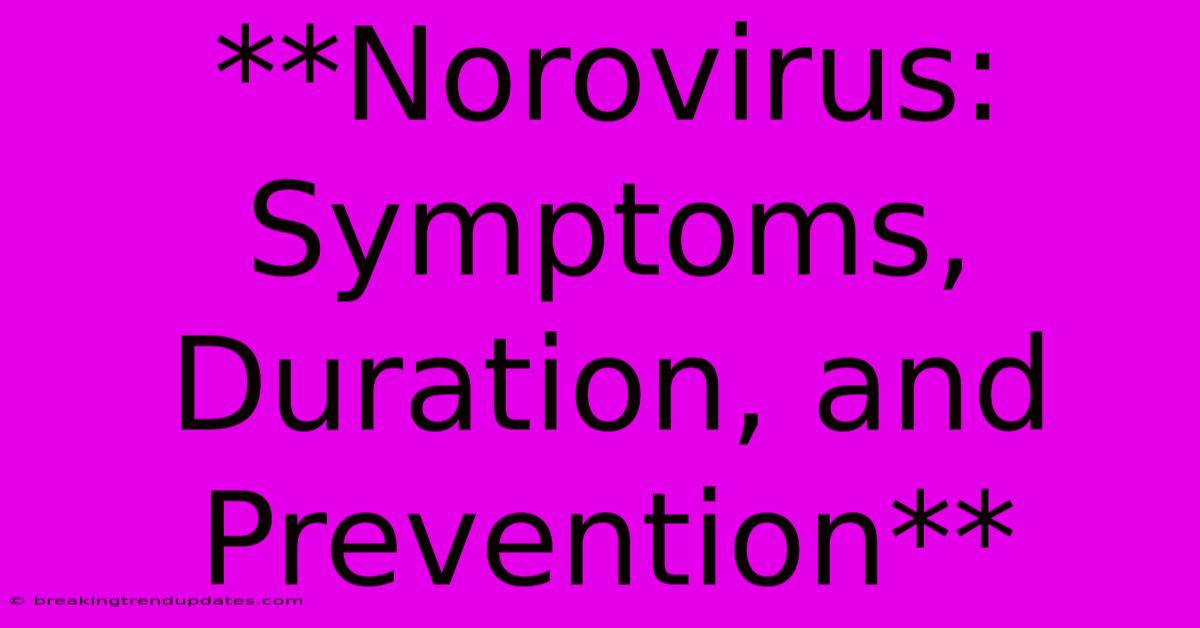**Norovirus: Symptoms, Duration, And Prevention**

Discover more detailed and exciting information on our website. Click the link below to start your adventure: Visit Best Website breakingtrendupdates.com. Don't miss out!
Table of Contents
Norovirus: Symptoms, Duration, and Prevention
Norovirus, often referred to as the "stomach flu," is a highly contagious virus that causes vomiting and diarrhea. It's a common illness, especially during the colder months, and can affect people of all ages. While typically mild and self-limiting, it can be unpleasant and, in some cases, lead to complications. Understanding the symptoms, duration, and prevention methods can help you manage and avoid this illness.
Symptoms of Norovirus
The most common symptoms of norovirus infection include:
- Vomiting: This is often the first symptom and can be sudden and forceful.
- Diarrhea: Watery diarrhea can be another prominent symptom, leading to dehydration.
- Stomach cramps: Pain and discomfort in the abdomen are frequent.
- Nausea: A feeling of uneasiness and the urge to vomit is common.
- Headache: A mild headache can accompany other symptoms.
- Low-grade fever: Some people may experience a slight fever.
- Body aches: Muscle aches and chills can also occur.
Duration of Norovirus
Norovirus symptoms typically start 12 to 48 hours after exposure to the virus. The illness usually lasts 1 to 3 days, although some people may experience symptoms for longer. Dehydration is a significant concern, especially in young children, the elderly, and individuals with weakened immune systems.
How Norovirus Spreads
Norovirus spreads through:
- Fecal-oral route: The virus can be transmitted through contaminated food, water, surfaces, or close contact with an infected person.
- Vomiting: Particles from vomit can quickly spread the virus in the air.
- Contaminated surfaces: The virus can live on surfaces for extended periods, making them a potential source of infection.
- Direct contact: Touching an infected person or objects they have touched can spread the virus.
Preventing Norovirus
While there is no specific vaccine or antiviral treatment for norovirus, you can take steps to prevent infection and limit its spread:
- Wash your hands frequently: This is the most important step in preventing norovirus. Wash your hands thoroughly with soap and water, especially after using the bathroom, changing diapers, and before eating.
- Clean and disinfect surfaces: Norovirus can survive on surfaces for several days. Clean and disinfect all surfaces that may have been touched by an infected person, especially bathrooms, kitchens, and food preparation areas.
- Avoid close contact with sick people: Stay away from people who are ill with norovirus.
- Wash fruits and vegetables thoroughly: Norovirus can contaminate fresh produce. Wash fruits and vegetables with clean water before eating.
- Cook food properly: Norovirus is destroyed by heat. Cook meat and poultry to the recommended temperature to eliminate any risk of infection.
- Practice good hygiene: Avoid touching your mouth, nose, and eyes with unwashed hands.
- Stay home when you're sick: This will prevent spreading the virus to others.
- Don't share utensils or towels: Use separate utensils and towels for each person to avoid cross-contamination.
Seeking Medical Attention
While most people recover from norovirus within a few days, it's important to seek medical attention if you experience:
- Severe dehydration: Signs include dry mouth, dizziness, decreased urination, sunken eyes, and rapid heartbeat.
- Persistent vomiting or diarrhea: These symptoms lasting more than a few days could indicate a more serious condition.
- Blood in vomit or stools: This is a sign of possible complications.
- High fever: A fever exceeding 101 degrees Fahrenheit could indicate a different infection.
- Difficulty breathing: If you experience trouble breathing, seek medical attention immediately.
Conclusion
Norovirus is a highly contagious virus that can cause unpleasant symptoms, but it's usually mild and self-limiting. By following preventative measures, you can significantly reduce your risk of infection. If you experience symptoms, stay hydrated, rest, and seek medical attention if necessary. With proper hygiene and awareness, you can protect yourself and others from this common illness.

Thank you for visiting our website wich cover about **Norovirus: Symptoms, Duration, And Prevention** . We hope the information provided has been useful to you. Feel free to contact us if you have any questions or need further assistance. See you next time and dont miss to bookmark.
Thank you for visiting our website wich cover about **Norovirus: Symptoms, Duration, And Prevention** . We hope the information provided has been useful to you. Feel free to contact us if you have any questions or need further assistance. See you next time and dont miss to bookmark.
Featured Posts
-
England Stumble In West Indies Odi Opener
Nov 01, 2024
-
Scissor Sisters Us Pop Icons In Birmingham
Nov 01, 2024
-
Handyverbot In Der Schule Fuer And Wider
Nov 01, 2024
-
Diwali 2024 Festival Of Lights Guide
Nov 01, 2024
-
Young Thug Sentenced To Time Served After Trial
Nov 01, 2024
